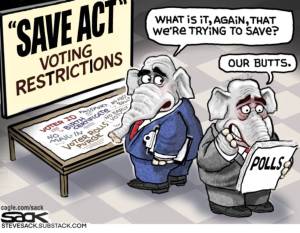Comment; Congress is broken, but term limits won’t fix it
Published 1:30 am Thursday, May 16, 2024
By Charlie Hunt / For The Conversation
There’s no denying that the current Congress has been one of the most chaotic in recent memory. The paralysis in 2023 and 2024 over the selection of the speaker of the House helped lead to one of Congress’ most unproductive years in history.
And although House Speaker Mike Johnson, a Louisiana Republican, survived an effort on May 8, by far-right members of his conference to oust him, the attempt is a signal of the dysfunction in Congress. It’s also a prime example of why so few Americans have a favorable view of the job Congress is doing.
For many Americans, the solution to this dysfunction is clear: Institute limits on the number of terms members of Congress can serve. If voters use term limits to “throw the bums out” and replace them with a new crop of elected leaders, the reasoning goes, the result will be a more effective and perhaps less polarized Congress.
According to recent surveys, 80 percent or more of the American people are in favor of congressional term limits. You’d be hard pressed to find another policy that more Americans from both sides of the aisle agree on.
Yet there’s a problem: Most political scientists agree that term limits are a bad idea. The evidence suggests that term limits create more problems than they solve and could even accelerate the polarization that’s been hobbling Congress for longer than a decade.
The value of long incumbencies: Advocates of term limits often point to a striking statistic to support the reform: the consistently high reelection rates of congressional incumbents. Current members of Congress enjoy a strong advantage from their status as an elected representative – that is, more name recognition and campaign resources than their challengers. Advocates for term limits say they are necessary to cut long-term incumbents’ service short in favor of new blood.
But term limits, often set at eight years in state legislatures, undervalue the benefits of representatives who have been serving in office for a long time. These members have had more time to gain knowledge and experience about Congress as an institution; develop policy expertise in issues important to their districts; and cultivate working relationships with fellow members that help them make policy more effectively.
Data from the Center for Effective Lawmaking, a research center with the University of Virginia and Vanderbilt University, which tracks members’ success rates for legislation they sponsor, strongly supports this perspective: The longer members serve, the more effective a lawmaker they are likely to become.
Fresh perspectives in Congress are important, which is why the U.S. has elections. But term limits would stifle members’ lawmaking careers just as they’re getting off the ground. Even worse, losing well-seasoned members with issue expertise would leave inexperienced lawmakers vulnerable to influence from lobbyists and special interest groups that would highlight their own expertise and seek to influence legislation in their favor.
This is precisely what has happened in state legislatures that instituted term limits around the turn of the century.
Term limits don’t solve extremism: Term limits are also unlikely to make Congress less ideologically extreme.
Judging from statements they’ve made, many of the more tenured members who are retiring at the end of the current Congress are the ones lamenting extremism and partisanship, often citing these trends as the reason they’re leaving.
Meanwhile, many of the most polarizing and best-known representatives in Congress — think Georgia’s Marjorie Taylor Greene, a Republican; Matt Gaetz of Florida, also a Republican; and Democrat Ilhan Omar from Minnesota — are newer members with less apparent interest in compromise and achievement of long-term policy goals. The data reflects this: The average long-serving member of Congress nearly always has lower ideological extremism scores than the average congressional newcomer, based on roll call votes on policy issues.
Vast majorities of Americans say they prefer a Congress that compromises to get things done. Term limits would almost certainly fail to achieve this.
Congressional ‘senioritis’: But this isn’t the only negative impact of term-limits reform.
Research by political scientist Gerald Wright suggests not only that term limits for state legislators were ineffective at reducing polarization, but that term-limited lawmakers — those legally prevented from running for reelection — tend to exert “decreased legislative effort” and missed roll call votes compared with their colleagues who are up for reelection.
In other words, members in their legally mandated final term in office enjoy a kind of “senioritis” — the apathy that can hit students in their last term of high school or college — in their legislatures because they don’t have to face the voters again at the ballot box.
Elections are the ultimate term limits: Most political scientists agree that high incumbent reelection rates are mainly the result of highly partisan districts and voters, not corrupt incumbents advantaged by years of service. The voters already have a say in primaries and general elections to vote out incumbents.
But they largely choose not to.
It is likely that very loose term limits — say, 20 years of service — could help prevent aging incumbents such as Mitch McConnell or the late Dianne Feinstein from serving well past their prime. But as a method for depolarizing Congress and making it effective again, the evidence is thin.
Charlie Hunt is an assistant professor of political science at Boise State University. This article is republished from The Conversation under a Creative Commons license.


